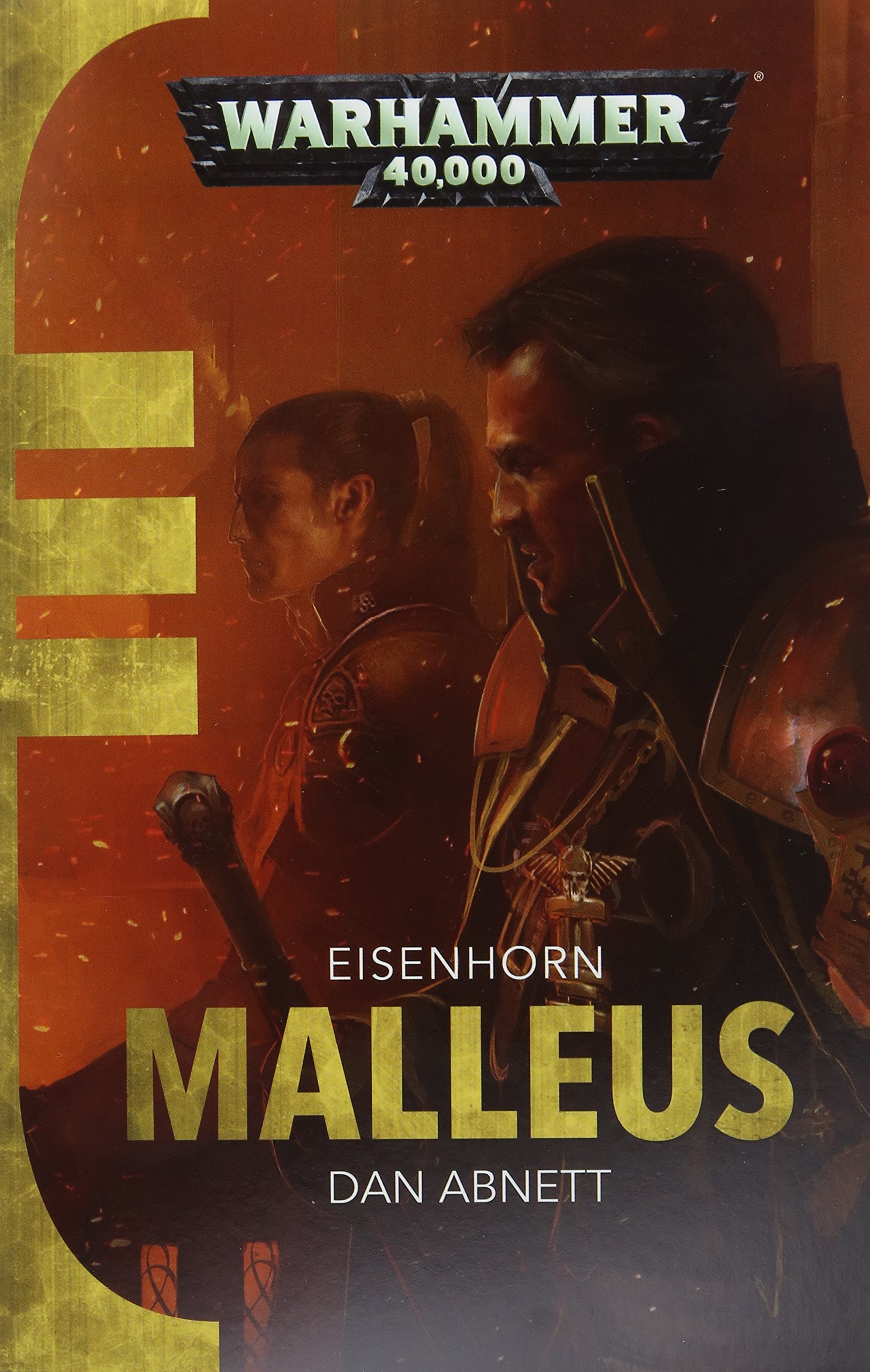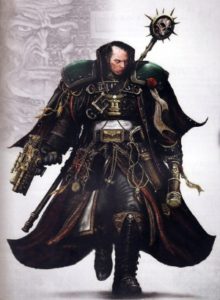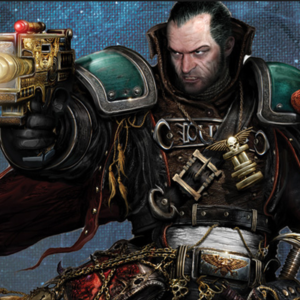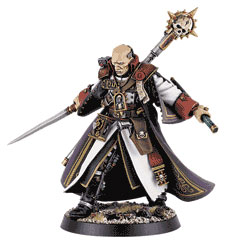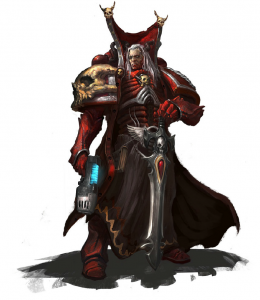Hello 40k fans! Chris Morgan, Chief Librarian of the Forge the Narrative Podcast, is here again with the next weekly segment of Tomes of the Librarius. Also, check the Tactics Corner for more great articles!
Just as a reminder, in this series we will explore facets of the history and legends of the Grimdark. This is meant to be an easy summary and introduction geared towards new players or people unfamiliar with the setting, but should still be an interesting read or fun refresher for those already familiar. There’s so much detail in this lore that a bare summary seems so inadequate, but for new people this should be the right portion to get a feel for the history of the universe we enjoy our games in.
This week we will continue our coverage on the Eisenhorn series. Malleus is the second installment in the series and focuses on the exploits of the iron-willed inquisitor 100 years after the conclusion of Xenos. Eisenhorn, now a venerable and respected inquisitor in his own right, is confronted with great loss as an old foe rears his ugly head to trouble the Imperium of Man. Not only that, Eisenhorn must also be wary as danger coming from within the Inquisition itself threatens not only his investigation, but also his life. We will continue in this article our exploration of Eisenhorn as a character and why this series is a must-read for Warhammer 40,000 fans.
Telling a Great Story
I have read from many authors both inside and outside the genre of 40k—such as Aaron Dembski-Bowden and Brian Sanderson—that the characters that you love have to be punished the most. Dan Abnett certainly follows this pattern with Gregor Eisenhorn. Even from the beginning, Malleus starts off on the premise that Eisenhorn is dying. Caught in the hunt for a heretic who consorts with Dark Eldar, it takes less than two chapters for Eisenhorn to fall at the brink of death while watching many of his beloved entourage tip over the edge.
There are a lot of new characters in the Eisenhorn series, which should come as no surprise as it has been 100 years since the epic conclusion of Xenos. When a book starts by showing you how much a character has accomplished and how comfortable he or she is, then you should be ready to watch as that all gets taken away. Where Xenos does a great job of establishing the character of Gregor Eisenhorn in the crucible of war and conflict, Malleus takes the crude form of his character and beats him into shape.
Great fiction never lets you fight your antagonist when you are at your best. instead it demands that you do the impossible from a position of weakness while taking incredible risks and somehow finding a way to succeed in spite of the odds. One of the reasons this book is so good is that Dan Abnett accomplishes this well, and without a silly Deus Ex Machina that invalidates the struggles the character had to go through to get to the conclusion. Reading this, you will love watching Eisenhorn work even as you wince and cringe as he loses more and more to accomplish his goals. For no other reason than that, this is a must-read.
So Why Does This Book Matter?
It is a given that Gregor will need to fight something and that his life will be in mortal danger at some point (or several) within any book or story he’s in. What pushes this novel beyond being just another ‘Adventures of Eisenhorn’ compilation of gallant escapades is how Gregor’s loyalty gets tested in many different ways. This novel asks very important questions about what it means to be a loyal servant of the Emperor. What do you do when you are accused of being guilty when you know you are innocent? What are you willing to sacrifice to fight against a greater evil? What lines can you cross and still call yourself true to your ideals? What are you willing to sacrifice to accomplish your ultimate goal? Do the ends justify the means? All of these questions are the core of what makes Inquisitors some of the most dynamic and complicated characters in the 40k universe, despite the often two-dimensional treatment they get in some video games and novels.
In Xenos, Eisenhorn’s loyalty goes without saying. He was a puritan, and wouldn’t hesitate to burn or destroy evil without a second though. Now, he must tackle with whether or not that mentality leads to best course of action. How can he reconcile actions that would mark him as a heretical and vile as any he had hunted in the past, even though without them he would surely fail? Through all the major trials that Gregor has to go through, he (if anything) doubles down on the core of who he is: a rock-solid servant of the Emperor whose will is a match for any temptation. Even as the universe burns around him, as he is betrayed by those who should be his allies, and as his friends lay dead, you can always count on Gregor to be a true servant of the Emperor.
There are likely some xenos fans out there thinking to themselves “but this is another Imperial book! Why should I have to read that?” To all of you, I would just encourage you (perhaps in vain) to reconcile yourself to the fact that the crux of the 40k lore is the Imperium of Man, and that understanding how it operates and what its relationship to the galaxy only adds more depth and a stronger foundation to the premises that all factions are built upon. The tragic dilemma of humanity with its broken systems and fraying power is at the core of what we so flippantly refer to as the ‘grimdark.’
You Sure You Hunt Aliens, Gregor?
On a funnier side note, I will risk a little elbow nudge to Dan Abnett for taking an alien hunter from the Ordo Xenos and constantly making him fight against the powers of chaos. Even the aliens in the Xenos novel were chaotic xenos so that only half-counts. Truly, I think Gregor may have ended up choosing the wrong Ordo! With today’s 40k lore refocus on chaos as the greatest and most imminent threat to life in the universe, the Eisenhorn novels do not seem out of place. To put credit where credit is due, Dan’s ability to take the warp and make it dance to his tune almost demands the inclusion of the cosmic horror elements he adds to these novels. As understanding the warp (perhaps a contradiction in terms) goes, Dan does a great job of fleshing out why even an alien hunter is most concerned about the madness in the sea of souls.
Inquisitorial Access Granted
I hope you have enjoyed this little foray into why this series is a staple of 40k fiction. I sure enjoyed writing it! I’d love to hear from you what you think the most pivotal and genre-defining stories in the Warhammer 40,000 universe are (don’t worry, Horus Heresy is definitely on my list).
Cheers,
Captain Morgan
And remember, Frontline Gaming sells gaming products at a discount, every day in their webcart!

